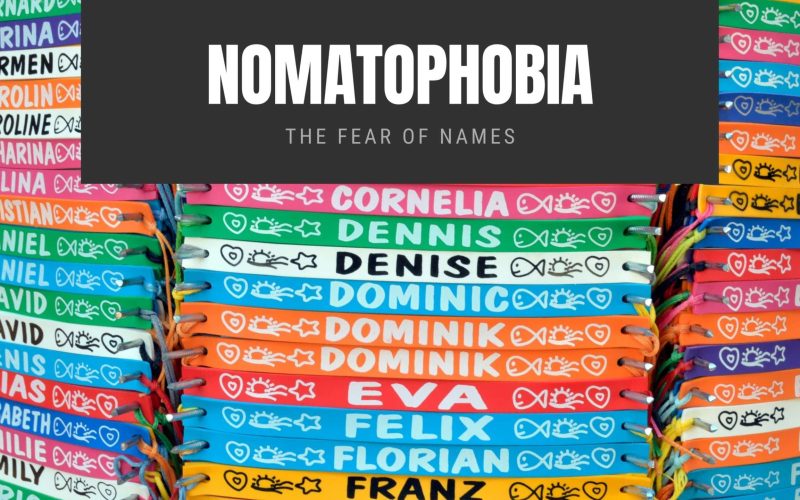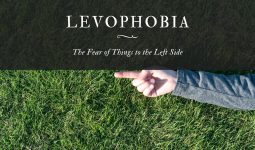Nomatophobia is the fear of names. As unbelievable as it may seem, some people have an irrational fear of names.
Names are like tags that we use to identify ourselves and other people or things. They make it easy for us to address individuals we meet and help others know when we are referring to them, not just the group.
When a person becomes afraid of names, they are said to suffer from Nomatophobia.
This phobia is only expressed when a person attributes fear to the individual or entity bearing the name. The phobia can be so profound that it is triggered simply by saying the name.
The sound of the feared name would invoke multiple symptoms of this irrational fear.
The word nam is of Latin origin (meaning name), and the word phobia is of Greek origin (meaning fear). Nomatophobia is categorized to be a specific phobia.
Nomatophobia is also closely related to Onomatophobia, which is the irrational fear of hearing a particular name or word.
Causes of Nomatophobia
Nomatophobia is a fear that often begins as a result of superstition. For example, there is reason to believe that using names is avoided in sporting events due to a fear of jinxing the whole team.
This fear is also subtlety introduced in our societies as some individuals who have prominence in a place may not be called by their proper name.
This is likely because of the fear associated with the perceived power that the individual may have.
Many people cannot talk about the devil with a good conscience. The name will most likely bring up fears they are not mentally prepared to deal with.
In some cultures around the world, it is not permissible to call out the name of their god. This is also reflected in their writing as they become a bit cryptic in referring to the deity they worship.
In this case, fear is essentially the outcome of the power that the individual transfers to the importance of a name.
That fear may be honor and reverence or the belief that calling out the name will result in the entity or individual hearing about it and then exacting retribution.
This idea might also be connected to a school bully or a feared gang leader. It may even be a great challenge for someone with this fear to whisper the feared name.
Nevertheless, It is a generally accepted conclusion that phobias may arise from a combination of external factors and events ( such as traumatic events) as well as internal predispositions (such as heredity or genetics).
Many specific phobias such as this can be traced back to a particular triggering event, most likely a traumatic experience at a tender age.
Agoraphobia and social phobias have causes that are more complex and not entirely known at present.
It is believed that genetics, heredity, brain chemistry, and life experiences play a major role in developing all phobias.
Symptoms of Nomatophobia
As with any phobia that exists, the symptoms greatly vary by person depending on the level of fear they experience.
The most common symptoms of all phobias are heart palpitations, trembling, chest pains, elevated blood pressure, rapid speech, shortness of breath, inability to speak, upset stomach, dry mouth, nausea, and cold or hot flashes.
One of the factors that may allow this phobia to appear somewhat less severe than others is the fact that those who deal with this fear can avoid saying the name that they fear.
The negative, however, would be the reaction they might experience if someone else calls a ‘forbidden’ name out loud.
The most common symptoms of Nomatophobia include:
- Elevated heart rate
- A keen sense of panic
- Sweating
- Furtive glances to see if the object of dread may show up
- Fainting
- A desire to hide
- Trembling
- Acute anxiety
Those who fear names may be quite vocal about wanting you and others to stop using the name they find offensive and even promise never to repeat it.
While this may seem silly to a person without such fear, it is essential to the nomatophobe.
How to Overcome the Fear of Names?
This fear is quite real and intense, but it may not be readily noticeable until a feared or offensive name is mentioned in a random or normal conversation.
A person who deals with this irrational fear may have to seek counseling if the root cause of the fear has been identified and a recovery solution has been developed.
It may not be enough to explain to the nomatophobe that the specific name, which they fear, does not have any special power.
In their minds, names do have power, and that power may be used to harm them. They seek to protect themselves by adopting a name-free lifestyle in this area.
These people have justified their responses over time, so a brief lecture on faulty logic will not help as much as it might distance you from that individual.
Can I Take Medicine to Treat Nomatophobia?
While medicine use isn’t the best approach, your therapist can prescribe medicine. However, it is essential to note that these medications can have some severe side effects or withdrawal systems that may be severe.
It is also imperative to note that there are no medicines designed to cure phobias. At best, the medications will only temporarily suppress the systems.
Unfortunately, in the quest for quick fixes, some people turn to alcohol and illegal drugs to treat their phobia symptoms.
All of these also do not treat phobias, but they can cause the person to develop an addiction to them.
Thankfully, there are some effective treatments for phobias, such as exposure therapy, cognitive behavioral therapy, and other forms of psychotherapy treatment.
Sometimes, one treatment method or a combination of methods may be adopted. How these methods work on patients is determined by the individual’s response.







